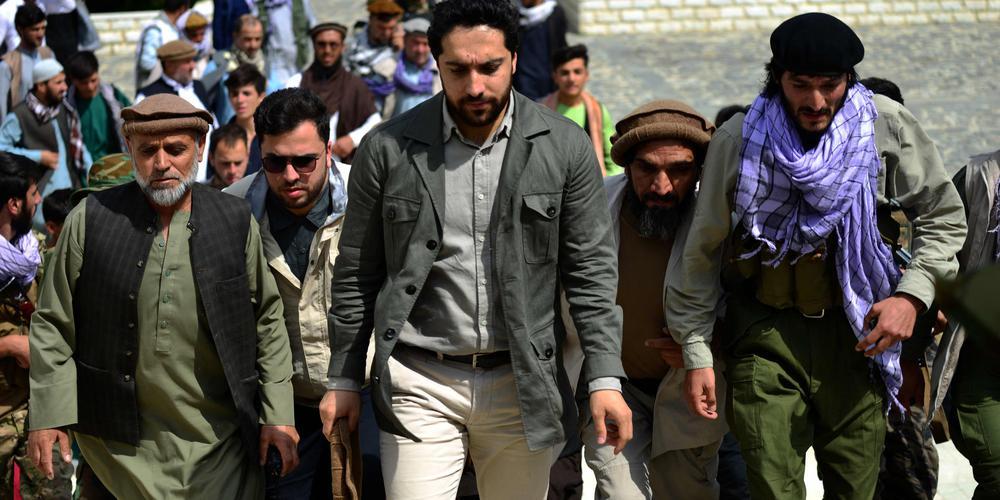Advertising
On 9 September 2001, two fake Al Qaeda suicide bombers came to interview Ahmad Shah Massoud, then detonated their bomb, killing the last major Afghan commander who was still resisting the Taliban.
Twenty years later, the assassination and the immediately subsequent 9 / 11, which triggered the American invasion, remain for many Afghans the starting point of two decades of bloody conflict, punctuated this summer by the Taliban's return to power.?
Read: Ahmad Massoud, leader of the resistance in the Panshir, says he is ready to discuss with the Taliban
Brilliant commander of the armies
Charismatic Ahmad Shah Massoud gained a reputation as a brilliant warlord in the 1980s, fighting against Soviet forces that occupied his province of Panshir, a heavily cramped valley in north-eastern Afghanistan.
Al Qaeda's leader, Osama bin Laden, will himself order the suicide mission that will kill him.
To approach him, his assassins claim to make a documentary for an Islamic cultural centre in Great Britain and use stolen Belgian passports.
When they arrived to interview Ahmad Shah Massoud at his base in Khwaja Bahauddin in August 2001, the latter was too busy to receive them.

"they spent ten days with us, waiting calmly and patiently for him to arrive, without too much insisting that the interview should be done quickly," Fahim Dashti, a journalist belonging to Commander Massoud's entourage, told AFP two weeks after the assassination.
Popular
When the time finally comes, Fahim Dashti prepares his own camera to record the interview and the two fake journalists ask their questions in Arabic to Massoud's closest advisor, Masood Khalili, who is responsible for translating them.
"we were not comfortable," Masood Khalili told AFP in October 2001, partly because both journalists had asked questions about Bin Laden. "the cameraman had a mean smile. The so-called journalist was very quiet."
As Commander Massoud reaches out to listen to translated questions, they detonate their bomb, hidden in their camera.
The assassination triggered a shock wave in Afghanistan and the rest of the world, especially in the West, where Massoud, who had studied at the Lycée franco-Afghan Istiqlal in Kabul, was very popular.
For some Afghans, he was considered the last hope against the Taliban, and Westerners saw him as a potential ally in the face of a fundamentalist regime they hated.
In September 2001, the Northern Alliance of Anti-Taliban warlords was in a bad position, and Massoud's relatives preferred to hide his death for days.
Mausoleum
A week after his death, thousands of people attended his burial in his native district of Bazarak. A marble mausoleum will then be built to house it, where its supporters will gather over the years.
"I was in the Panshir when he was killed. Resistance forces (panchiria) were surrounded from all sides," recalls a 47-year-old resident of the province to AFP, who prefers to keep his name silent for security reasons. "on the radio, the Taliban announced: 'your leader is dead and you are defeated', he recalls.
The tide is turning with 9 / 11 and the intervention a few weeks later in United States Afghanistan to punish the Taliban for harbouring Bin Laden.
The Taliban regime fell at the end of the year, swept away by American bombardments, who were themselves guided on the ground by Northern Alliance fighters. His Al Qaeda allies, who hoped to strike hard in Afghanistan with the death of Commander Massoud, also fled.
The return of the Taliban
Twenty years later, the Taliban have just returned to power, thanks to the withdrawal of the Americans and a flash offensive that led to the collapse of the pro-Western government, with little or no fighting in Kabul and other major cities.
And the Panshir resumed its role as the last resistance, this time led by Commander Massoud's son, Ahmad, who was 12 years old at the time of his death and took the lead of the National Resistance Front (NRF) against the Taliban.
But the latter quickly sent fighters to encircle the province, before entering it and declaring it conquered last Monday.
Among the victims killed in the fighting was Fahim Dashti, the journalist who had survived the attack on Massoud twenty years earlier.
Ahmad Massoud, whose whereabouts are unknown, called for the struggle to continue. His uncle, the brother of Commander Massoud, Ahmad Wali, admitted that the NRF had one knee on the ground, but claimed that thousands of combatants could return to fight in the province.
The situation is difficult for Mohammad Sana Safa, 63, who had fought the Soviets with Commander Massoud.
"Ahmad Massoud is a patriot, but he is young and does not have the military experience of his father," he says. Then he sighed: "the fall of the Panshir in the face of the Taliban... if (his father) were still alive, we would never have seen it."
The summary of the week France 24 invites you to come back to the news that marked the week
Je m'abonneTake international news everywhere with you! Download the France 24 app
360 Caméra Vidéo Market Size & Share 2022 – Global Business Review, Key Findings, Forecast by Regions, Growth Strategy, Developing Technologies, Trends and Company Profiles – Sphericam Inc, Panono, Bubl, Samsung – athleduweb.be
Yubico unveils its security key with fingerprint reader
5 Bonnes Raisons d’Acheter La Huawei Watch Fit Special Edition Noir
Comment Utiliser le Honor Magic 6 Lite et MagicOS 7.2 : Combinaison Parfaite de Technologie et D'humanité